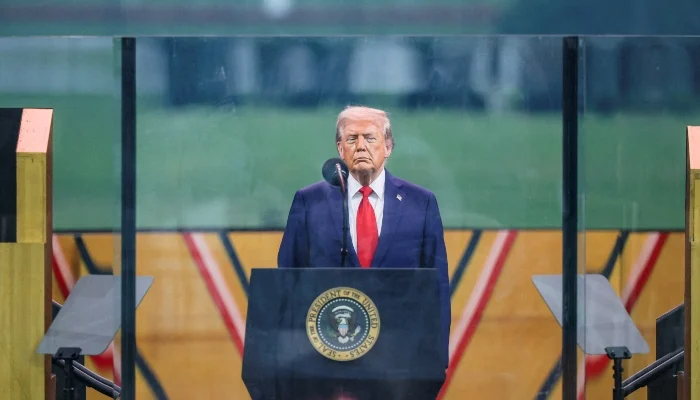President Donald Trump stated on Sunday to a news network that it remains conceivable for the United States to become involved in the Iran-Israel conflict, and that he would be “open” to Russian President Vladimir Putin serving as a mediator.
“It’s possible we could get involved” in the ongoing hostilities between the Middle East’s perennial adversaries, Trump remarked in an interview, as reported by ABC News. The outlet further noted that the Republican president emphasized the United States is “not at this moment” engaged in military action.
Regarding Putin’s potential role as a mediator in the conflict, Trump informed an ABC News reporter, “he is ready. He called me about it. We had a long talk about it.”
Israel and Iran launched new attacks against each other overnight into Sunday. The US president suggested the conflict could be easily resolved while simultaneously issuing a warning to Tehran against striking any US targets.
Israeli rescue teams diligently searched through the debris of residential buildings demolished by the strikes, employing flashlights and sniffer dogs in their quest for survivors. Authorities reported that at least seven people, including children, had been killed.
Tehran has called off nuclear talks, which Washington had indicated were the sole means to halt Israel’s bombing. Meanwhile, Prime Minister Benjamin Netanyahu asserted that Israel’s attacks thus far pale in comparison to what Iran would experience in the coming days.
“If we are attacked in any way, shape or form by Iran, the full strength and might of the US Armed Forces will come down on you at levels never seen before,” Trump declared in a message on Truth Social.
“However, we can easily get a deal done between Iran and Israel, and end this bloody conflict.”
Trump did not provide any specifics regarding a potential agreement.
Iran reported that 78 people were killed on the first day of Israel’s campaign on Friday, with scores more on the second. This included 60 fatalities when a missile destroyed a 14-story apartment block in Tehran, where 29 of the deceased were children.
The Shahran oil depot in Tehran was targeted in an Israeli attack, Iran stated, adding that the situation was under control. A fire had erupted after an Israeli attack on an oil refinery near the capital, while Israeli strikes also targeted Iran’s defense ministry building, causing minor damage, as reported by the semi-official Tasnim news agency on Sunday.
In Israel, the latest wave of Iranian attacks commenced shortly after 11 pm on Saturday (2000 GMT), as air raid sirens blared in Jerusalem and Haifa, sending approximately a million people into bomb shelters.
Around 2:30 am local time (2330 GMT Saturday), the Israeli military issued a warning of another incoming missile barrage and urged residents to seek shelter. Explosions reverberated through Tel Aviv and Jerusalem as missiles streaked across the skies, met by interceptor rockets launched in response. The military lifted its shelter-in-place advisory nearly an hour after the warning was issued.
Yemen’s Iran-aligned Houthis announced on Sunday that they had targeted central Israel’s Jaffa with several ballistic missiles in the last 24 hours, marking the first instance of an Iranian ally joining the hostilities.
Israel’s ambulance service reported at least seven fatalities overnight, including a 10-year-old boy, a young girl, and a woman in her 20s, with over 140 injured in multiple attacks.
Israeli media indicated that at least 35 people were missing after a strike hit Bat Yam, a city south of Tel Aviv. A spokesperson for the emergency services stated that a missile struck an 8-story building there, and while many people were rescued, there were fatalities.
The exact number of buildings hit overnight remained unclear.
As of now, at least 10 people in Israel have been killed and over 300 injured since Iran initiated its retaliatory attacks on Friday.
A round of US-Iran nuclear talks, scheduled to be held in Oman on Sunday, was canceled, with Iranian Foreign Minister Abbas Araqchi stating that discussions could not proceed while Iran was subjected to Israel’s “barbarous” attacks.
Gas field attack:
In what appeared to be the first attack to impact Iran’s energy infrastructure, Tasnim news agency reported that Iran partially suspended production at South Pars, the world’s largest gas field, after an Israeli strike caused a fire there on Saturday.
The South Pars field, located offshore in Iran’s southern Bushehr province, accounts for the majority of gas produced in Iran.
Concerns about potential disruptions to the region’s oil exports had already driven up oil prices by 9% on Friday, even though Israel spared Iran’s oil and gas infrastructure on the first day of its attacks.
An Iranian general, Esmail Kosari, stated on Saturday that Tehran was reviewing the possibility of closing the Strait of Hormuz, which controls access to the Gulf for tankers.
With Israel indicating that its operation could last weeks, and Netanyahu urging the Iranian people to rise up against their Islamic clerical rulers, fears of a regional conflagration dragging in outside powers have intensified.
Tehran has warned Israel’s allies that their military bases in the region would also come under fire if they assisted in shooting down Iranian missiles.
However, 20 months of war in Gaza and a conflict in Lebanon last year have significantly weakened Tehran’s strongest regional proxies, Hamas in Gaza and Hezbollah in Lebanon, thereby limiting its options for retaliation.
Israel views Iran’s nuclear program as an existential threat and stated that the bombardment was designed to prevent the final steps toward the production of a nuclear weapon.
Tehran maintains that its program is entirely civilian and that it does not seek an atomic bomb. Nevertheless, the UN nuclear watchdog reported this week that Iran had violated its obligations under the global non-proliferation treaty.



